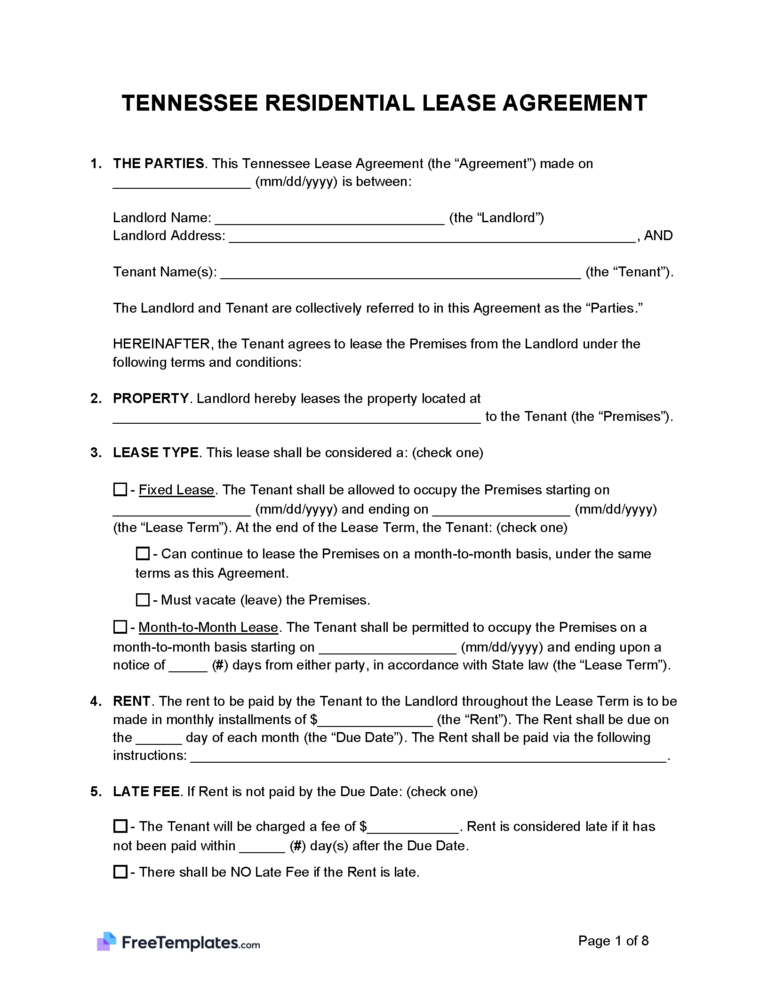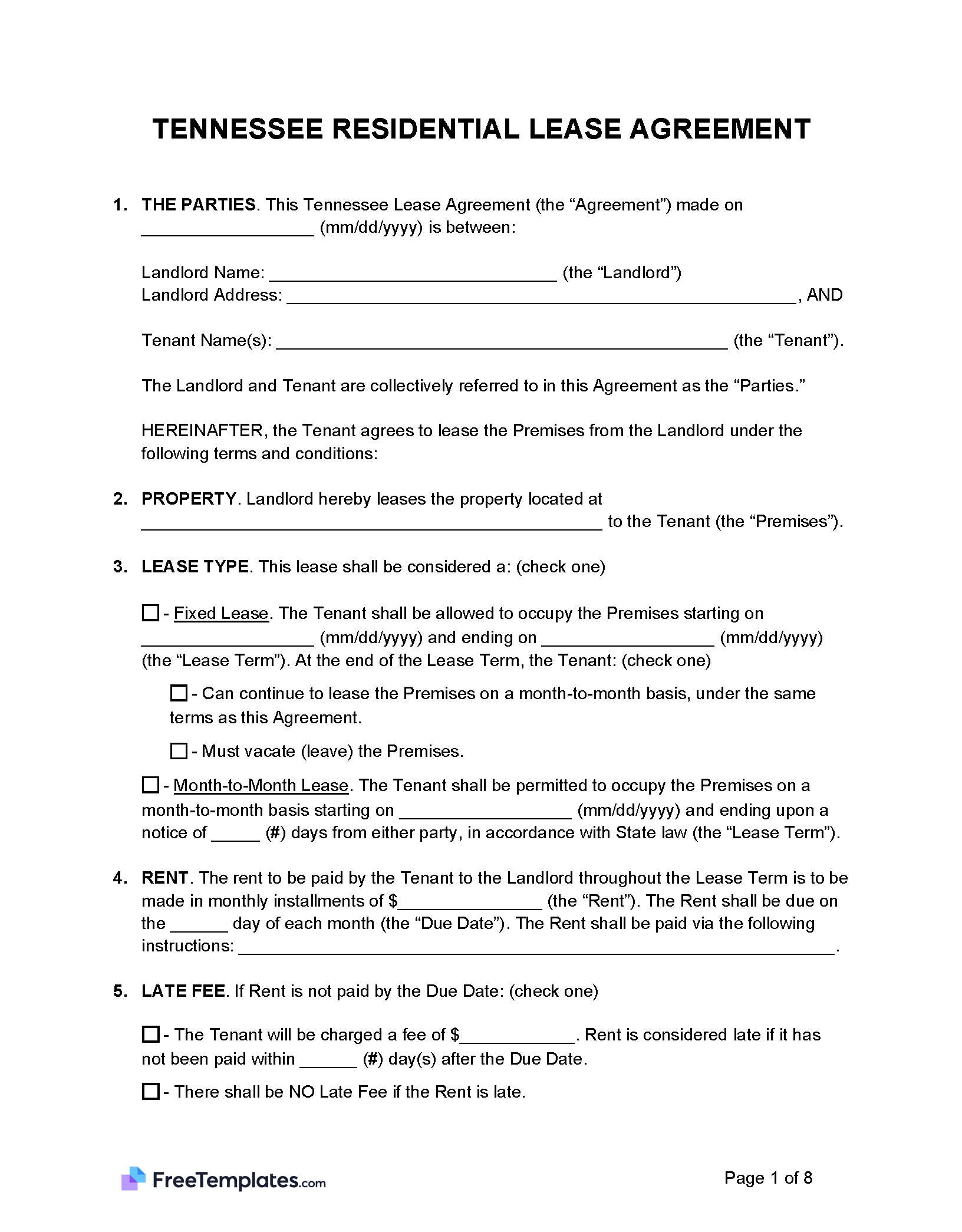By Type (6)
| Standard Lease Agreement – A common property rental agreement between a landlord and a tenant for a set period of time. |
| Commercial Lease Agreement – A contract between a business and a landlord for property rental of an office, retail, or commercial space. |
| Month-to-Month Lease Agreement – This agreement continues on a month-to-month basis and usually ends with a 30-day notice by either party. |
| Rent-to-Own Agreement – A rental agreement in which the landlord is willing to sell the property they are renting to their tenant. |
| Roommate Agreement – A document between two tenants of a rental property that shares a living space. |
| Sublease Agreement = A legal document in which a tenant rents out all or some of their leased space, usually with written approval from the landlord. |
Disclosures (3)
Lead-Based Paint Disclosure – Any property being rented in the state of Tennessee built prior to 1978 may contain lead paint. Therefore, a disclosure must be provided to the tenant on or before the start of the rental. EPA/HUD Fact Sheet
Landlord’s Contact Details – The landlord is responsible for informing the tenant who manages and owns the rental property and providing their address on or before the start of the lease agreement. (§ 66-28-302)
Showings – It must be stated in the lease agreement that the landlord gives a 24-hour notice to a tenant before showing the property, and it may only be shown in the last 30 days of the lease term. (§ 66-28-403(e)(5))
Security Deposit
Maximum Amount – There is no maximum amount a landlord can charge for a security deposit in the state of Tennessee.
Returning to Tenant – After the lease ends, the landlord is responsible for notifying the tenant of their owed security deposit. If they inform the tenant and the tenant does not respond within 60 days, they forfeit the security deposit balance. (§ 66-28-301(f))
Separate Bank Account – In Tennessee, the landlord is required to keep the security deposit in a separate account for all residential leases. (§ 66-28-301(a))
Landlord Access
General Access – While there is no minimum notice time to give a tenant before a landlord can access the property, they are advised to obtain the tenant’s consent for access and may not abuse the privilege. § 66-28-403 A 24-hour notice is recommended if the landlord needs to show the unit to a new tenant. (§ 66-28-403(e)(5))
Emergency Access – In Tennessee, a landlord may enter the property without notifying the tenants if there is an emergency. (§ 66-28-403(b))
Paying Rent
Grace Period – Tennessee has a 5-day grace period for late rent. The landlord may not charge any late fee or penalty for up to 5 days. If the rent remains unpaid, the landlord has the right to serve the tenant with a 14-day notice to quit or pay. (§ 66-28-201(d))
Maximum Late Fee – A landlord may charge a maximum late fee of 10% of the monthly rent due. (§ 66-28-201(d))
Returned Checks (NSF) – In the state of Tennessee, writing a bad rent check may result in a maximum fee of $30. (§ 47-29-102)
Withholding Rent – If a tenant does not receive essential utilities from the landlord after notification, then they may pay for the utilities themselves and deduct the cost from the rent. (§ 66-28-502(a)(1)(A))
Reasons for Eviction (3)
Non-Payment of Rent – Rent is due on the due date stated in the lease agreement. Failure to pay on time may result in the landlord issuing the tenant a 14-day notice to quit or pay. (§ 66-28-505(a)(2))
- Exception – A 7-day notice to quit or pay may be issued if the tenant fails to pay the rent on time twice in six months. (§ 66-28-505(a)(2)(B))
Non-Compliance – All tenants must comply with the lease agreement policies. Failure to comply may result in the landlord issuing a 14-day notice to quit or comply.
- Exception – If a tenant commits a second non-compliance violation within 6 months, the landlord may serve a 7-day notice to quit or comply.
Tenant Maintenance – Renters must abide by the following rules: (§ 66-28-401)
- Follow all building and housing rules
- Keep the unit clean and safe
- Dispose of trash and waste
- No damages are to be done to the property
- Keep the peace and do not disturb the neighbors.
Vactating – If the tenant vacates the property, the landlord may terminate the lease if payments have not been made within 30 days.
- Duty to Re-rent – The landlord may re-rent the property if the property has been vacated. (§ 66-28-507(c))

